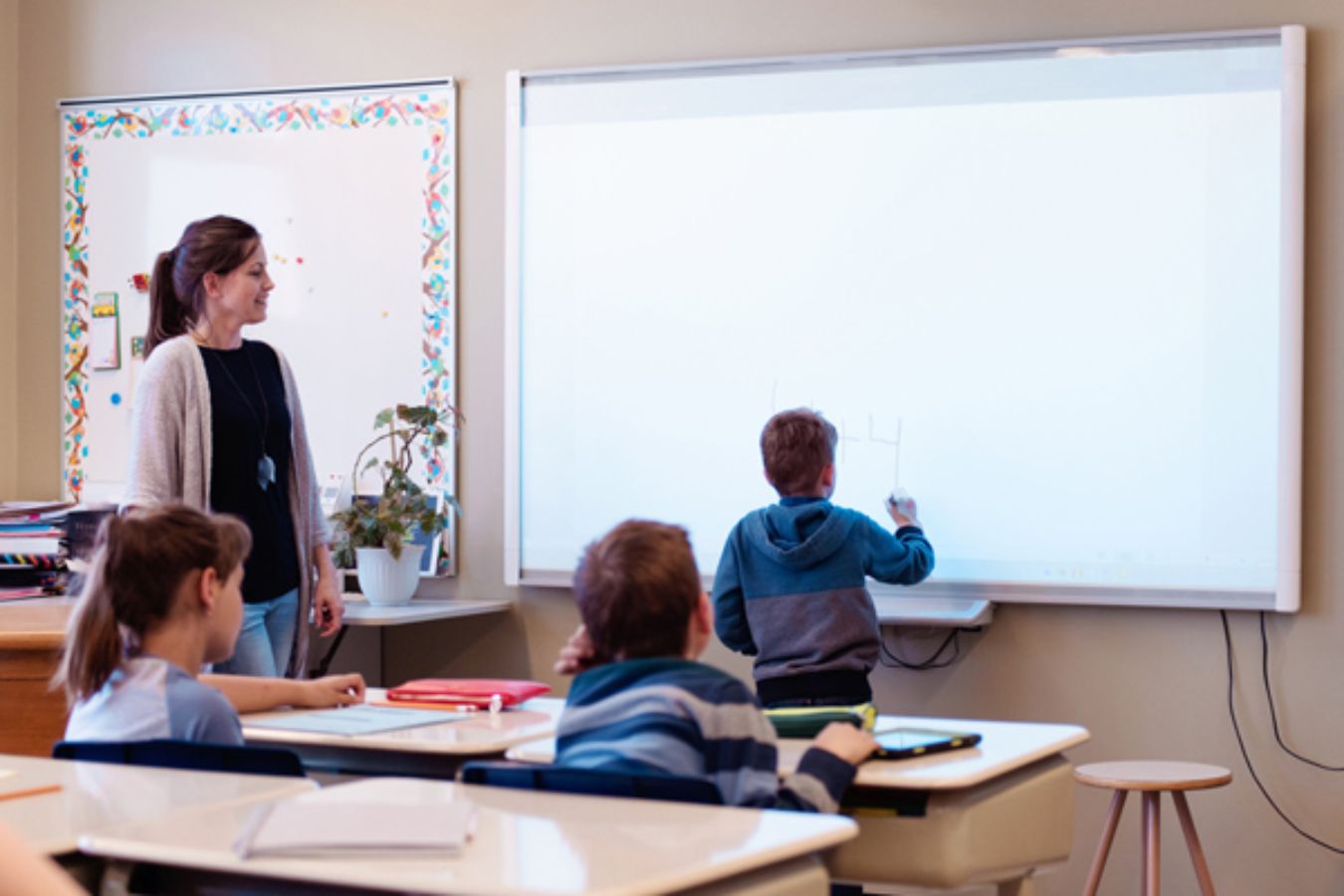Ms. Zumbrägel, what was the situation with regard to the digital equipment of schools in your district when you kicked off this project last year?
All in all, the situation was not too bad. Of course, digital technology advances constantly, and so we definitely had some deficits in certain areas. But in comparison with elsewhere, our schools in the Cloppenburg district were generally pretty well-equipped. And yet, when it comes to the future prospects of young people, ‘not too bad’ is simply not good enough.
You are planning to invest around €16 million between now and 2024. How many schools will benefit from this money?
The scope of the project covers four secondary schools, four schools for children with special needs, and three vocational schools. That’s a total of more than 11,000 students and 880 teachers. Some of this investment is funded through the DigitalPakt.
The project is scheduled to be completed in 2024. What’s the current state of progress?
By the end of this year, the digital setup of the schools will be almost – but not quite – complete, meaning that most of the required equipment such as interactive boards, laptops, tablets, and almost 800 PCs for students, teachers, and administrative staff will be in place. The next step will be to gradually replace equipment that has been in use for some time, in order to ensure that all facilities are equipped with state-of-the-art technology and kept up to date. This also involves staying abreast of technological innovations and any needs that schools may have in terms of new or additional equipment.
How important is the topic of digital education in your district?
Very important. This is reflected, for example, in the fact that the 2019 project tender was the biggest we have ever had in the school sector. But if you want to get ready for the future, you have to embrace working on this scale. There is just too much at stake. That’s why we adopted a comprehensive digital strategy for the district in 2019. But infrastructure is only one part of the equation. We also need educational concepts centered on improving digital literacy. This will be a key priority in the coming years. The media development plan for the district of Cloppenburg, which sets out guidance for the years ahead, is currently being revised.
What impact has COVID-19 had on the project?
The coronavirus pandemic has definitely accelerated the implementation, because it urgently highlighted the need for very good infrastructure. Remote learning became the order of the day. But the experience we gathered during the pandemic will also inform how we operate in normal conditions. Concepts such as ‘tablet classes’ for example, are gaining importance and attracting interest from a growing number of schools. As I said before, putting excellent infrastructure in place is only one part of the equation. The crucial question is what we do with this infrastructure. And in this respect, COVID-19 has helped us to gauge quite clearly which approaches are most effective.
What feedback have you had from schools?
The feedback has been really positive, even though it is obviously not always possible to offer every item on every school’s wish list. But the schools recognize that we are doing something groundbreaking in Lower Saxony and that the project has already delivered a whole host of benefits. Especially during the pandemic, when schools were focusing heavily on remote learning, the digital equipment that had already been put in place proved extremely helpful to them.
What are the main areas of application for digital concepts?
Home schooling naturally became a very common scenario. During lessons, a lot of digital teaching materials are being used. For example, teachers might play video clips. Educational games bring a level of interactivity to the classroom that books and other media do not offer. And then there is online research. The toolset is really very large and varied. Administrative structures have also been greatly simplified, for example with regard to timetables and grades. I would say that our culture of communication and interaction in general has been elevated to a new level. The switch from traditional blackboards to smartboards was, of course, a very significant step. We’ve moved on from ‘chalk and talk’, so to speak.
CHG-MERIDIAN won a new EU-wide tender for this project and now supplies you with the necessary infrastructure. What gave its proposal the edge?
It was not just a matter of price. The references, the size of the company, and the wider concept all worked in its favor. In the end, the overall package offered by CHG-MERIDIAN scored highest among the tenders received. We are also very pleased that we have been allocated designated contact persons for the implementation phase. This means that if we have any questions or concerns, we can reach out and feel confident that someone will be on hand straight away to help us find a simple and flexible solution, while never losing sight of our circumstances as a customer.

What role did sustainability play in the selection?
Sustainability was not an evaluation criterion as such. But climate change mitigation is an aspect of public-sector contracts that is attracting ever closer scrutiny. So, in that sense, the end-to-end sustainability concept of CHG-MERIDIAN certainly contributed to the overall strength of the tender. After all, sustainability is a cause very close to our hearts in the district of Cloppenburg.
You had not originally planned to use TESMA® to manage the project but subsequently changed your mind and opted for it…
… and we are so glad we did! It has saved us from battling with endless Excel files. The process couldn’t be simpler or more convenient. Ordering, approval, and replacement processes are managed in an automated manner. Everything is very well structured and no manual intervention is required. Here too, we are aiming to harness all the benefits that the digital age has to offer.
Facts and Figures
- Digital learning methods make lessons more tailored to individuals, more engaging, and more productive. According to a study by Lancaster University, the use of digital media increases students’ motivation and speed of learning, improves the culture of interaction within the classroom, and facilitates inclusion.
- The EU estimates that 90 percent of all jobs will soon require digital skills.
- According to the eGovernment Monitor 2020 study, digital teaching took place in 85 percent of households with school-age children during the coronavirus pandemic. Three-quarters of students reported problems with home schooling. The main reasons cited included an inadequate internet connection, lack of digital literacy among teachers, and poor coordination of communication channels. Many schools also lack sophisticated learning platforms.




